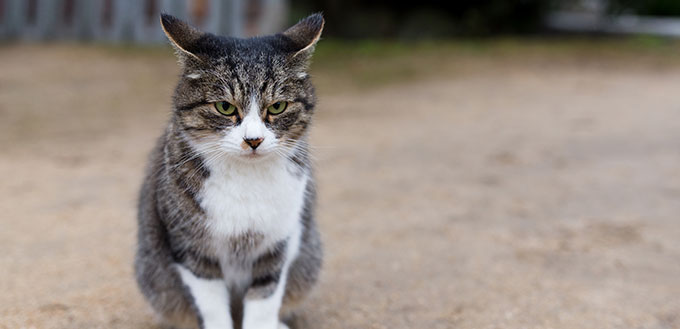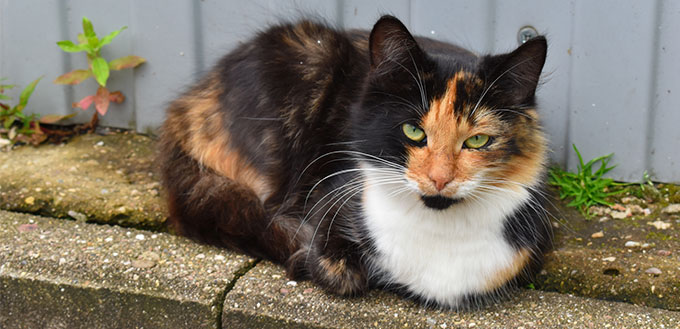Scooting is a behavior that involves pets dragging their rear end across the ground. It may also include rubbing their bottom against items all over the house or scratching. This behavior is seen mostly among dogs. Still, it is not uncommon to see a cat dragging butt all over the place. They scoot because their butts itch or are irritated. As with other pets, your feline friend’s act of dragging her rear end has causes. This action should not be of much concern as there are ways to deal with it. So, if you’re asking yourself ‘Why is my cat scooting and what should I do, then this article will help you greatly as we look at symptoms, causes and treatments of scooting.
Symptoms of Scooting in Cats
Identifying signs of scooting should not be difficult. But for pet owners who are not around much, here are a few indicators that hint of cat scooting. It is worth knowing that you do not need to see all these symptoms. Rather about four of these should signify that there is an issue of scooting. These symptoms should have existed or been observed for at least one week.
- Butt dragging
- Intense licking of rear end
- Foul-smelling discharge during and after scooting
- Constipation/Diarrhea
- Enlarged anal region
- Blood-filled discharge
Why is My Cat Scooting?
Your cat is scooting to reduce the irritation and itching that comes with other underlying conditions. These conditions usually are centered around the digestive system. These include parasitic infestation, allergic reactions, anal gland issues, and fleas. This portion of the article gives readers a brief knowledge of the causes of why your cat is dragging butt all over the place.
- Intestinal Parasites
Intestinal parasites like worms are major culprits when it comes to cat scooting. Veterinarians suggest parasitic worms such as tapeworms are the most common parasites implicated in this case. They get into your cat’s gut through infected fleas and rodents. The body of tapeworms are long and ribbon-like and filled with eggs. Once they get into the host, they break off and spread all over the gastrointestinal tract. They absorb the nutrients meant for your cat and cause them irritations. This can be controlled through deworming. These worms are observable in your feline’s feces as white rice-like substances. Other parasites are implicated but are not noticeable by the naked eye. Intestinal parasites can be prevented by keeping your environs clean and sanitary. This virtually eliminates the risk of spreading infection among pets. Other signs of parasitic infections include; vomiting, diarrhea or constipation, loss of weight, and sometimes a potbelly.
- Allergies
If you see your cat scooting on floors or rubbing her butt on other surfaces, then there is something wrong with her. This behavior may be a result of allergies. Not all foods are suitable for cats. Therefore, feeding them meals that do not agree with their gastrointestinal makeup can cause reactions. These reactions include; irritations that spread all over the body, vomiting, and sometimes swellings across your four-legged friend’s body. The allergies are not limited to foods only. There are also environmental allergens such as dust mites, dust, fleas, grass, mold, and many under hidden triggers. These manifest in similar ways to food allergies. These can be reduced through medical treatments. Avoidance of allergens is even better. If you have some qualms about what triggers allergic reactions in your feline pal, then visit your nearest vet for further information.
You may also like our review on Hypoallergenic Cat Food
- Impacted Anal Glands
Another reason for cats scooting butt all over the house can be due to impacted anal glands. Before we look at what this means, it would be wise to know what the anal glands are and their roles in our cat’s life. Anal glands are tiny sac-like protrusions in the rectal area of cats. They secrete strongly scented fluids. These pungent fluids are designed to help felines mark their territories to warn off intruders of any kind. The fluids from the anal glands also help to pass feces by lubricating the rectal area. They help to keep the poop on track. When there are issues like bacterial infection and others, the anal gland cannot secrete the fluids properly, leading to it being impacted. Impacted anal glands can be identified by; a foul-smelling odor, an inflamed anal area, the visibly distressing process of defecation, bloody rectal area, and excessive licking of the butt. The moment you see these, you should send your cat to the vet. Impacted anal glands are usually treated with antibiotics and pain medications and sometimes sedatives.
Treatment of Scooting in Cats
Scooting is usually treated based on the underlying cause. Your vets are the best options to determine this and the course of treatment. If your cat scooting butt is as a result of parasitic infestations in the gastrointestinal tract, your vet is more likely to prescribe cat dewormers to deal with the parasites. In the event, this is due to allergic reactions, medications will be prescribed, but it would be better if you identified and kept your cat away from the allergens. You might also consider a change in diet. If impacted anal sacs are the culprits, then antibiotics and other procedures may be done by the vet to reduce both infections and the filled anal sacs. Ideally, you should consult your vet first before anything is done.
What to Do When Your Cat Is Scooting
If you notice your cat scooting, then the first thing you should do is call your vet. You can help by keeping your cat calm and assessing the anal area and the tail. Maybe you may see blood or find some evidence in parasite infested poop. In other cases, you might find something sticking out of their rear end. The best course of action will be to remove the foreign body carefully and gently clean the area. You should also contact your vet and monitor your cat for further scooting.
To Summarize
While your cat will sometimes scoot to mark her territory, sometimes she does it for other reasons. Scooting can be a real problem for both cats and pet parents. If you see your cat scooting, check for obstructions, blood, and foreign or strange particles in her feces. These might probably a result of parasitic infestation, allergic reactions, something stuck in her butt, or an infection caused by impacted anal glands. Treatment is based on the cause. The best thing to do for your cat is to call the vet before taking any course of action. If not treated with immediate effect, the problem could escalate to something else.








